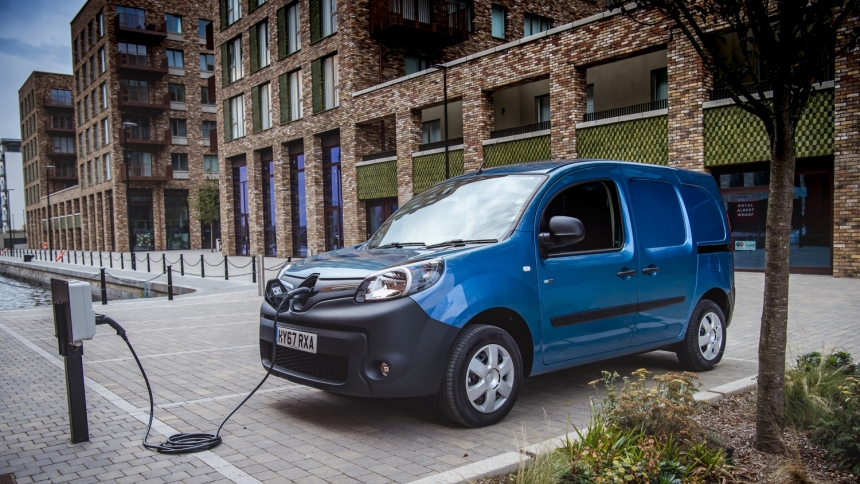All you need to know about electric vans
If you find yourself driving vans a lot, whether that be for work or as your own personal vehicle, then you’ve probably considered an electric van at one point or another. With the changing state of the world, electric cars and vans are becoming increasingly popular and sought after.
Environmental changes
More than ever before, people are concerned about the current state of the world we live in. With growing concerns about pollution and climate change, it’s only natural that we are looking to make things electric where possible. In fact, The London Ultra Low Emission Zone (ULEZ) was recently put in place to reduce the amount of carbon emissions in the city and help to improve the quality of the air. Like the Congestion Charge, owners of certain vehicles now have to pay a fee to drive in the selected areas. Drivers of electric cars and vans will not have to pay the fee as the vehicles do not emit NOx or CO2.
There’s a lot of growth in the UK market for electric vehicles, and many van manufacturers are starting to sell electric vans to keep up with the demand. You may have already seen manufacturers such as Nissan, Citroen, Renault and Peugeot with their own collection of electric vans, and you can expect to see more from other companies in the coming months and years.
How do they work?
Electric vans work almost exactly like regular vans, except the diesel or petrol fuel tank and engine are replaced with an electric system to make it run. As technology is advancing, electric vehicles are becoming more and more powerful and efficient; previously, they have had the reputation of being a lot of hassle and have been criticised for needing to be recharged too often. These days, you will find that most electric vans can do a full days work before needing to be recharged - and they can be recharged at night when not being used!
What are the benefits of an Electric Van?
Electric vehicles offer a wide range of benefits. Here, we’ll look through some of them.
Eco-friendly - Electric vehicles do not pollute the air with NOx or CO2, which means that each person who chooses an electric car or van is one step close to ensuring we have cleaner air - this is especially needed in cities and urban areas. They are better for the environment than petrol and diesel vehicles, so go cleaner and greener with an electric van!
If you decide to use renewable energy when recharging your vehicle, then you’ll be doing even more for the environment by reducing greenhouse gas emissions. Certain models have also been using environmentally sourced materials - so there is even more potential to be environmentally friendly!
Quiet - The battery in an electric vehicle enables it to be much quieter! This can make for a very calming driving experience and helps to reduce noise pollution.
Safe - There are said to be more health benefits from electric vehicles due to the lack of toxic emissions. Electric vehicles are also less likely to start a fire or explosion and are said to be safer in the event of a collision.
Ease of use - All electric vehicles are automatic which means no more struggling with the gearstick! They are also said to be more responsive than the average vehicle and can stop and accelerate more promptly.
Less expensive to run - You could save yourself a lot of money every year by switching to an electric van instead of petrol and diesel. An electric vehicle can be a great investment for drivers who want to become more cost-effective - electricity is cheaper per mile than petrol and diesel, so you’ll be saving more money as you go!
Lower charges - As previously mentioned, you will also be able to miss out on paying the fee for The London Ultra Low Emission Zone, and can get a reduced fee to pay for any congestion charges if your electric vehicle meets the right criteria!
Less costly to maintain - Special grants from the government, along with reduced maintenance requirements, mean that electric vehicles are much easier to maintain than petrol or diesel vehicles. They are designed to be as efficient as possible, so it makes sense that they should see less wear and tear than a standard vehicle - for example, the battery in an electric vehicle can last 10 to 12 years without having to be replaced.
Things to consider
The above points make a great argument in favor of electric vehicles, but it is also important to consider the other factors too.
Electric vehicles cost a lot more than regular ones, so they can be difficult to afford right off the bat. The government grants can help with this, and you could consider the van as a kind of investment that will eventually pay itself off; you’ll be spending less per mile on electricity and won’t have to shell out as much money for the maintenance of the vehicle.
It’s no surprise that you will not be able to go as far with an electric vehicle. However, technology is advancing and electric vehicle batteries are now able to sustain more electricity to make them go further. Still, mileage can be a concern for many drivers so it’s important to be aware - especially if you’re looking for an electric transit van to be used for commercial purposes. An electric van may be best for drivers with shorter commutes and distances to travel.
It’s important to do research on the make and model of electric van that you’re interested in, as this can have an effect on mileage, sustainability and more. For example, newer vehicles are likely to be able to recharge faster than older ones, but newer electric vans will cost more of course!
Thinking of switching?
Since the law changed in 2017, it has been easier than ever for van drivers to be able to make the switch from a petrol or diesel van to an electric one as van drivers no longer need a new license for gas or electric vehicles.
The government also issued a plug-in van grant to help reduce the price of electric vehicles and encourage more drivers to make the switch. This grant would be given to car dealerships to cover 20% of the costs, enabling them to reduce the sale price of vans and make them more affordable. Only electric vehicles that have been chosen by the government and meet the required guidelines are eligible for the grant, however, so you’ll need to bear this in mind when looking at a new electric van!
Be sure to consider your situation and what you want the electric van to be used for. If the primary function will be to use with your family, pick up the kids from school and go to the shops then an electric van may be a good choice. If you’re looking for an electric transit van for work, however, then you must seriously consider what distances you will need to travel and what recharging points will be on your route. It may turn out that a standard petrol and diesel van is the more appropriate option for your needs.
Shopping for your new van
If you’ve decided that an electric van is the right choice for you, then you’ll need to start thinking about how to get one!
Research - This is the most important part and should be the first thing you do! Look into different models and manufacturers, check out the specs and consider the mileage. A good way of getting an idea of what the vehicle will be like is from reading electric van reviews. Unbiased reviews of different makes, models and types of electric vans can tell you things that the manufacturers won’t, and will give you a better insight into how the vehicle might work for you.
Buying from new - If you have money saved up and can afford to purchase an electric van brand new then - congrats! It’s up to you whether to buy straight from the manufacturer or through a dealership. However, for most of us, that isn’t an option - luckily there are some other choices out there.
Buying used - There will be many electric vans that are for sale that have been used, and this will mean that they’ll come at a cheaper price! Check out online dealerships and be sure to compare to get the best price on a used electric van.
Leasing - Getting an electric van on lease is an option if you’re looking for something more short term. Leasing an electric van can also mean you spend a lot less money as it helps to spread the cost. There are many websites and van dealerships that offer electric van leasing, so shop around until you find what you’re looking for.
If you’re looking for further information on commercial vans and electric vans of any kind, then don’t hesitate to contact us. Our friendly staff are always on hand to help you, so please get in touch if you have any questions.




Comments
Post a Comment